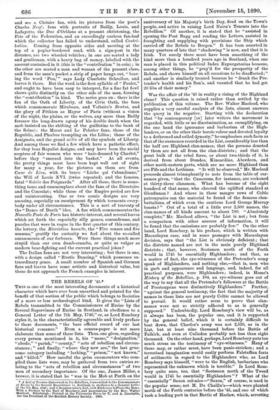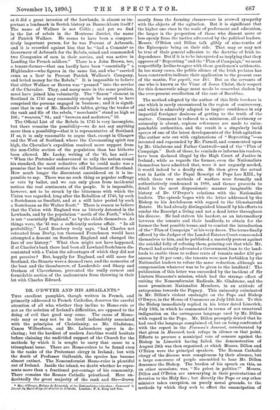THE REBELS OF '45.*
THIS is one of the most interesting documents of a historical character which have ever been unearthed and printed for the benefit of that section of the public which belongs to Societies of a more or less archaeological kind. It gives the "Lists of Rebels transmitted to the Commissioners of Excise by the Several Supervisors of Excise in Scotland, in obedience to a General Letter of the 7th May, 1746," or, as Lord Rosebery styles it, in the characteristically agreeable and lively preface to these documents, " the bare official record of our last historical romance." Even a census-paper is not more elaborate than some of these lists. Thus, one gives, regarding every person mentioned in it, his "name," "designation," "abode," "parish," "county," "acts of rebellion and circum- stances ; " and finally, " where they now are," the last grue- some category including " lurking," " prison," " not known," and "killed." How careful the grim enumerators who com- piled these lists were, may be gathered from two entries re- lating to the "acts of rebellion and circumstances" of two men of secondary importance. Of the one, James Miller, a brewer, it is stated that he " was in the Mob at Perth on the • A List of Persons Concerned in the Rebellion, transmitted to the Comminsioners of Excise by the Several Supervisors in Scotland, in obedience to a General Letter Of the 7th May, 1746; and a Supplementary List, with Evidences to Prove the Same.
With a Preface by the Earl of Rosebery, and Annotations by the Rev. Walter Macleod. Edinburgh : Printed at the University Press by T. and A. Constable, for the President of the Scottish History Society. 1890.
anniversary of his Majesty's birth Day, fired on the Town's people, and active in raising Lord Nairn's Tenents into the Rebellion." Of another, it is stated that he " assisted in opening the Post Bagg and reading the Letters, assisted in fraughting and supplying with provisions the Ship which carried off the Rebels to Bergen." It has been asserted in many quarters of late that " shadowing " is new, and that it is Irish. Yet surely there must have been something of the kind more than a hundred years ago in Scotland, when one man is placed in this political Index Expurgatorius because, among other things, he " pray'd for the prosperity of the Rebels, and shows himself on all occasions to be disaffected;" and another is similarly treated because he " drank the Pre- tender's health and his Son's, and vaunted that he had got 20 libs of their money."
Was the affair of the '45 in reality a rising of the Highland clans P This question is raised rather than settled by the publication of this volume. The Rev. Walter Macleod, who supplies a very careful analysis of the lists, almost answers the query in the negative. Starting with the declaration that " by contemporary [or] later writers the movement is regarded, with little or no discrimination, as exemplifying, on the one hand the ignorance and barbarism of the High- landers, or on the other their heroic valour and devoted loyalty to a dethroned and exiled dynasty," he emphasises such facts as that of the surnames recorded in the List, considerably less than the half are Highland clan-names; that the persons denoted by them are not all from the clan-districts ; and that the great bulk of the rebel force, or about two-thirds of it, is derived from about Dundee, Kincardine, Aberdeen, and other north-eastern parts, which are no more Highland than are Fife and the Lothians. " It will be observed," Mr. Macleod proceeds almost triumphantly to note from the table of sur- names given, "that the Cameron, for instance, are reckoned at thirty-three clansmen. What has become of the eight hundred of that name, who cheered the uplifted standard at Glenfinnan P And where in these meagre rows of Celtic patronymics can the material be found of the famous clan- battalions, of which even the cautious Lord George Murray. boasts P" Ont of a total of a little over 2,500 names, the clan-names of all kinds amount to about 780. "Absolutely complete," Mr. Macleod allows, "the List is not ; but from a comparison with other sources of information, it will be found that the omissions are probably few." On the other hand, Lord Rosebery, in his preface, which is written with Macaulayan ease, and in some passages with Macaulayan decision, says that " the List is obviously deficient ; that the districts named are not in the main purely Highland districts ; that, however, Scotsmen north of the Forth would in 1745 be essentially Highlanders; and that, as a matter of fact, the eye-witnesses of the Pretender's army speak of Highlanders, and nothing else,—that is, men who in garb and appearance and language, and, indeed, for all practical purposes, were Highlanders ; indeed, in Home's History of the Rebellion, p. 104, an eye-witness goes out of the way to say that all the Pretender's followers at the Battle of Prestonpans were distinctively Highlanders." Further, " against the general testimony, the fact that the majority of names in these lists are not purely Celtic cannot be allowed to prevail. It would rather seem to prove that clan- names were not so strictly adhered to as is generally supposed." Undoubtedly, Lord Rosebery's view will be, as it always has been, the popular one, and it is supported by the general belief, which it is certainly difficult to beat down, that Charles's army was not 2,520, as in the List, but at least nine thousand before the Battle of Falkirk, and even at Culloden probably not less than eight thousand. On the other hand, perhaps, Lord Rosebery puts too much stress on the testimony of "eye-witnesses." Many of these may, or rather must, have been panic-stricken ; and a terrorised imagination would easily perform Falstaffian feats of arithmetic in regard to the Highlanders who, as Lord Rosebery says himself, " were to the English, barbarians who represented the unknown which is terrible." Is Lord Rose- bery quite sure, too, that "Scotsmen north of the Tweed would in 1745 be essentially Highlanders " P What of the " essentially" Saxon colonies—" Saxon," of course, is used in the popular sense, not M. Du Chaillu's—which were planted north of the Forth centuries before the '45, and one of which took a leading part in that Battle of Harlaw, which, arresting
as it did a great invasion of the Lowlands, is almost as im- portant a landmark in Scotch history as Bannockburn itself ? The name of Wallace is not Celtic ; and yet we find in the list of rebels in the Montrose district, the name of Patrick Wallace. He seems to have been a compara- tively important person, for he was Provost of Arbroath, and it is recorded against him that he " had a Commisn as Governour of Arbroath for the Rebels, raised and commanded two Companies of men in their service, and was active in Landing the French soldiers." There is a John Brown, too, a tenant-farmer—that can hardly have been " essentially " a Highlander—who figures in the same list, and who " carried arms as a lieut in Provost Patrick Wallace's Company, and levied money for the Rebels." It is impossible to believe that either Wallace or Brown was " pressed " into the service of the Chevalier. They, and many more in the same position, must have joined him voluntarily. The " Saxon " element in Scotland in 1745 may reasonably enough be argued to have comprised the persons engaged in business ; and it is signifi- cant that in one of Mr. Macleod's tables, giving the trades of the rank and file of the rebels, " merchants " stand as high as 106 ; " weavers," 84 ; and " brewers and monsters," 58.
The Official List of the Rebels in 1745 is very incomplete, but there remains the possibility—we do not say anything more than a possibility—that it is representative of Scotland. If so, it is only reasonable to argue that, except in Glasgow and the West of Scotland, where the Covenanting spirit ran high, the Chevalier's expedition received more support from the non-Celtic section of the population than has hitherto been allowed. Mr. Lecky, writing of the '45, has said :- " When the Pretender endeavoured to rally the nation round his standard, the most seductive offer he could make was a promise that he would restore the old Parliament of Scotland. How much longer the discontent smouldered on it is im- possible to say. There was no such thing as popular suffrage or vote by ballot, and we can only glean from incidental notices the real sentiments of the people. It is impossible, however, not to be struck by the bitterness with which the Union was regarded, long after the Rebellion of 1745, by such a Scotchman as Smollett, and at a still later period by such a Scotchman. as Sir Walter Scott." There is reason to believe that the Union with England was as bitterly detested in the Lowlands, and by the population " north of the Forth," which is not "essentially Highland," as by the chiefs themselves. As things were, the '45 was a sufficiently serious affair. " In all probability," Lord Rosebery truly says, "had Charles not retreated from Derby, ten thousand Frenchmen would have attempted a descent on Southern England and changed the face of our history." What then might not have happened, if at Charles's back there had been all Lowland Scotchmen dis- contented with a Union the advantages of which they did not yet perceive ? But, happily for England, and still more for Scotland, the Stuarts were a doomed race, and the memories of the boot and the thumbscrew, of Lauderdale and Sharp and Graham of Claverhouse, prevented the really earnest and formidable section of the malcontents from throwing in their lot with Charles Edward.



















































 Previous page
Previous page